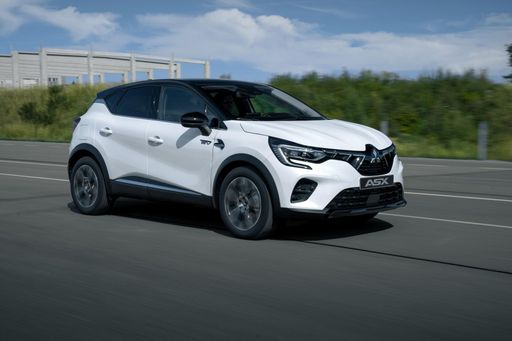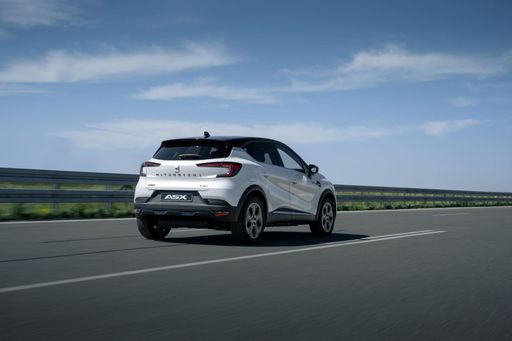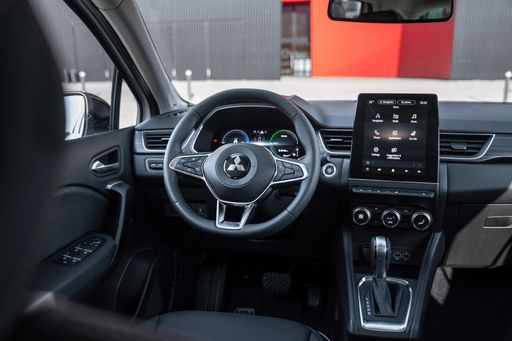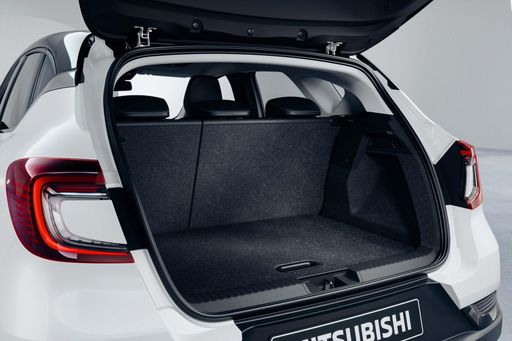Mercedes Sprinter Transporter vs Mitsubishi ASX – Differences & prices compared
Compare performance, boot space, consumption and price in one view.
Find out now: which car is the better choice for you – Mercedes Sprinter Transporter or Mitsubishi ASX?
The Mercedes Sprinter Transporter (Cargo Van) comes with a Electric or Diesel engine and Automatic or Manuel transmission. In comparison, the Mitsubishi ASX (SUV) features a Petrol, Petrol MHEV or Full Hybrid engine with Manuel or Automatic transmission.
When it comes to boot capacity, the Mercedes Sprinter Transporter offers , while the Mitsubishi ASX provides 484 L – depending on how much space you need. If you’re looking for more power, decide whether the 204 HP of the Mercedes Sprinter Transporter or the 158 HP of the Mitsubishi ASX suits your needs better.
In terms of consumption, the values are 27.10 kWh7.90 L per 100 km for the Mercedes Sprinter Transporter, and 4.60 L for the Mitsubishi ASX.
Price-wise, the Mercedes Sprinter Transporter starts at 26900 £, while the Mitsubishi ASX is available from 20600 £. Compare all the details and find out which model fits your lifestyle best!
Mercedes Sprinter Transporter
The Mercedes-Benz Sprinter Transporter is renowned for its versatility and reliability, making it a popular choice for businesses across various industries. Featuring a spacious and intelligently designed interior, it offers ample cargo space while ensuring comfort for the driver. With a reputation for durability and advanced technology, the Sprinter continues to set standards in the commercial vehicle sector.
detailsMitsubishi ASX
The Mitsubishi ASX presents itself as a compact crossover that combines practicality with style. Its sleek design and versatile interior make it an appealing choice for both urban and rural settings. With a focus on providing a comfortable driving experience, the ASX also offers a range of modern features that enhance connectivity and safety.
details @ Mitsubishi
@ Mitsubishi
 @ Mitsubishi
@ Mitsubishi
 @ Mitsubishi
@ Mitsubishi
 @ Mitsubishi
@ Mitsubishi

|
|
|
|
|
Costs and Consumption |
|
|---|---|
|
Price
26900 - 72900 £
|
Price
20600 - 32000 £
|
|
Consumption L/100km
7.9 - 12.7 L
|
Consumption L/100km
4.6 - 6 L
|
|
Consumption kWh/100km
27.1 - 31.5 kWh
|
Consumption kWh/100km
-
|
|
Electric Range
194 - 444 km
|
Electric Range
-
|
|
Battery Capacity
56 - 113 kWh
|
Battery Capacity
0.60 kWh
|
|
co2
0 - 333 g/km
|
co2
105 - 135 g/km
|
|
Fuel tank capacity
71 L
|
Fuel tank capacity
48 L
|
Dimensions and Body |
|
|---|---|
|
Body Type
Cargo Van
|
Body Type
SUV
|
|
Seats
3
|
Seats
5
|
|
Doors
4
|
Doors
5
|
|
Curb weight
2052 - 3166 kg
|
Curb weight
1296 - 1501 kg
|
|
Trunk capacity
-
|
Trunk capacity
348 - 484 L
|
|
Length
5932 - 7367 mm
|
Length
4239 mm
|
|
Width
1993 mm
|
Width
1797 mm
|
|
Height
2331 - 2663 mm
|
Height
1575 mm
|
|
Payload
577 - 2641 kg
|
Payload
399 - 449 kg
|
Engine and Performance |
|
|---|---|
|
Engine Type
Electric, Diesel
|
Engine Type
Petrol, Petrol MHEV, Full Hybrid
|
|
Transmission
Automatic, Manuel
|
Transmission
Manuel, Automatic
|
|
Transmission Detail
Manual Gearbox, Automatic Gearbox
|
Transmission Detail
Manual Gearbox, Dual-Clutch Automatic, Automatic Gearbox
|
|
Drive Type
Rear-Wheel Drive, All-Wheel Drive
|
Drive Type
Front-Wheel Drive
|
|
Power HP
114 - 204 HP
|
Power HP
91 - 158 HP
|
|
Acceleration 0-100km/h
-
|
Acceleration 0-100km/h
8.5 - 14 s
|
|
Max Speed
90 km/h
|
Max Speed
168 - 180 km/h
|
|
Torque
300 - 450 Nm
|
Torque
160 - 270 Nm
|
|
Number of Cylinders
4
|
Number of Cylinders
3 - 4
|
|
Power kW
84 - 150 kW
|
Power kW
67 - 116 kW
|
|
Engine capacity
1950 cm3
|
Engine capacity
999 - 1598 cm3
|
General |
|
|---|---|
|
Model Year
2024 - 2025
|
Model Year
2024
|
|
CO2 Efficiency Class
A, G
|
CO2 Efficiency Class
D, C
|
|
Brand
Mercedes-Benz
|
Brand
Mitsubishi
|
Mercedes Sprinter Transporter
The Evolution of the Mercedes-Benz Sprinter Transporter
The Mercedes-Benz Sprinter has been a staple in the commercial vehicle sector for decades, known for its reliability, versatility, and impressive load capacity. The latest iterations, including the fully electric eSprinter variants, demonstrate Mercedes-Benz's commitment to innovation and sustainability. These vehicles are designed to meet the needs of various business applications, providing numerous options to cater for all logistical demands.
Electrification and Engine Options
The Mercedes-Benz Sprinter Transporter offers a wide range of engine choices, from traditional diesel engines to state-of-the-art electric powertrains. Diesel options are available in capacities ranging from 114 PS to 190 PS, providing durable performance for long hauls while maintaining decent fuel efficiency, with consumption between 7.9 and 12.7 litres per 100 km. The electric eSprinter, on the other hand, boasts an output of either 136 PS or 204 PS, with a consumption of about 26.3 to 30.7 kWh per 100 km, and offers a range of up to 453 km depending on the battery size.
Technical Specifications and Safety Features
The Sprinter Transporter carries a diverse set of technical options to enhance both functionality and safety. The models are equipped with either manual or automatic transmissions, with choices in rear-wheel drive or all-wheel drive options. The eSprinter highlights innovative features such as regenerative braking and a robust electric motor delivering up to 450 Nm of torque.
On the safety front, the Sprinter includes features such as active distance assist, blind spot assist, and lane-keeping assist to ensure maximum security for drivers and goods alike.
Dimensions and Payload Capabilities
Designed for versatility, the Sprinter Transporter showcases various configurations in terms of dimensions and payload capacities. Lengths range between 5932 mm to 7367 mm, widths settle at 1993 mm, and heights vary from 2331 mm to 2663 mm, accommodating a range of business needs. With a payload capability of up to 2641 kg, the Sprinter is well suited for heavy-duty tasks, offering ample load volume and accessibility.
Inside the eSprinter Experience
Stepping into the eSprinter offers an advanced driving experience, tailored to the demands of modern day logistics. The electric variants include new telematics systems for fleet management, offering remote diagnostics and optimised communication between vehicles and back-office operations. Moreover, features such as a user-friendly cockpit, comfortable seating, and advanced climate control mirror the premium standards of Mercedes-Benz, ensuring drivers enjoy every aspect of their journey.
Conclusion: Mercedes-Benz Sprinter Leads the Charge
The Mercedes-Benz Sprinter remains at the forefront of the commercial vehicle market, offering a blend of power and innovation across its diesel and electric models. With its forward-thinking technology, the eSprinter sets new standards in environmental stewardship without compromising on performance or utility. It is an excellent choice for businesses looking to transition to more sustainable transport solutions while benefiting from the reliability and quality that Mercedes-Benz is known for.
Mitsubishi ASX
The Mitsubishi ASX: A Modern SUV with Advanced Features
The Mitsubishi ASX continues to be a popular choice for SUV enthusiasts, combining sleek design, impressive efficiency, and innovative technology. The 2024 model year introduces an array of improvements, making it a worthy contender in its category. In this article, we will delve into the technical details and innovative aspects of the Mitsubishi ASX, presenting why it stands out in the SUV segment.
Sophisticated Powertrains and Efficiency
Under the bonnet, the Mitsubishi ASX offers a variety of powertrain options, catering to different driving preferences. Customers can choose from petrol engines, mild-hybrid systems, and full-hybrid configurations, balancing power and efficiency effectively.
The performance spectrum ranges from 91 PS to 158 PS, demonstrating the vehicle's versatility. With a fuel consumption of between 4.7 and 6 L/100km, the ASX effectively manages fuel efficiency without compromising on performance. The car's CO2 emissions range from 107 to 135 g/km, placing it within CO2 efficiency classes C and D.
Advanced Transmission Options
The ASX offers a mixture of manual and automatic transmissions to meet diverse driving needs. Its gearbox specifications include a standard manual option and automatic options such as dual-clutch transmissions, providing a seamless driving experience. Depending on the variant, the vehicle can accelerate from 0 to 100 km/h in as little as 8.5 seconds, reaching maximum speeds between 168 and 180 km/h.
Modern Design and Spacious Interior
Externally, the ASX reflects contemporary design aesthetics, with dimensions of 4239 mm in length, 1797 mm in width, and 1575 mm in height. Internally, it accommodates up to five passengers comfortably and offers a respectable boot capacity ranging from 348 to 484 litres. Despite its spaciousness, the SUV maintains an optimal weight between 1296 and 1501 kg, which aids in delivering its intended driving dynamics.
Safety and Technology Innovations
Mitsubishi prioritises safety and technology in the ASX. It is equipped with the latest driver-assistance systems, enhancing safety and convenience. The modern infotainment system integrates smoothly with smartphones, ensuring that connectivity is at the driver's fingertips. Moreover, various trimming levels such as "Intro Edition DCT" and "Top Automatik" allow customers to select features best suited to their lifestyle, from basic utilities to luxury enhancements.
Conclusion: A Balanced SUV Choice
The Mitsubishi ASX stands out as a well-rounded SUV choice for those who prioritise efficiency, reliability, and modern technology. Its array of powertrains, stylish design, and advanced safety features make it an attractive option within its price range of €23,990 to €37,390. The ASX's 2024 model reaffirms Mitsubishi’s commitment to offering innovative yet practical vehicles to the global market.
The prices and data displayed are estimates based on German list prices and may vary by country. This information is not legally binding.
